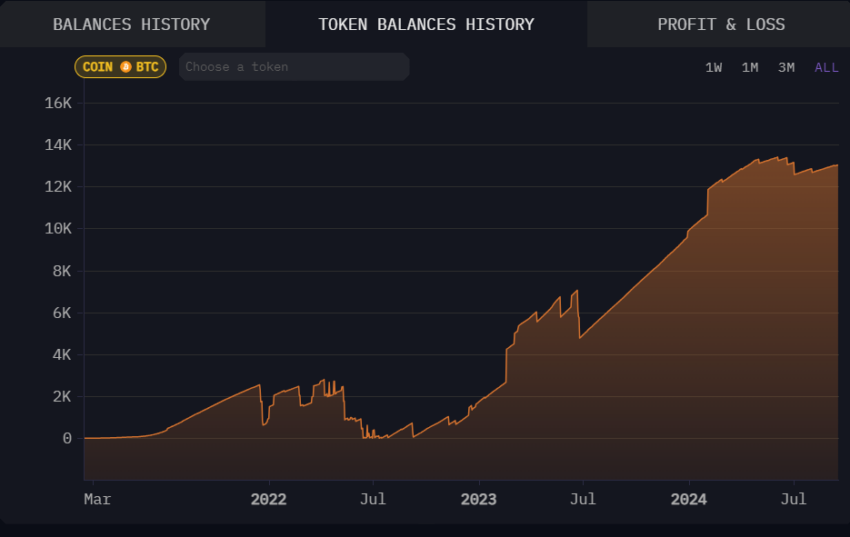Virginia-based software company MicroStrategy has announced a $700 million convertible bond offering to boost its Bitcoin reserves and pay down debt.
The offering, targeting qualified institutional buyers, will mature in 2028. The firm expects it will raise significant capital to redeem $500 million in existing debt while acquiring more Bitcoin.
From Boardrooms to Kingdoms: Bitcoin Adoption Grows Worldwide
The notes will bear interest payable semi-annually and will be convertible into cash, MicroStrategy shares, or both. Additionally, MicroStrategy intends to use the remaining funds to acquire even more Bitcoin, reinforcing its position as a corporate giant in the crypto space.
“The notes will be unsecured, senior obligations of MicroStrategy, and will bear interest payable semi-annually in arrears on March 15 and September 15 of each year, beginning on March 15, 2025. The notes will mature on September 15, 2028, unless earlier repurchased, redeemed, or converted in accordance with their terms,” the official announcement reads.
This latest bond issuance reflects MicroStrategy’s continued reliance on leveraging debt to increase its Bitcoin holdings while managing its existing debt obligations. Since 2020, MicroStrategy has raised billions through similar note offerings.
In 2024, the company completed several notable offerings. These include $603.75 million in convertible notes in March and $800 million in June.
At the time of writing, MicroStrategy holds 244,800 BTC worth around $14 billion. This figure roughly equals 1.17% of Bitcoin’s total supply of 21 million.
In a related development, Bhutan has emerged as a significant player in the Bitcoin market. The kingdom’s Bitcoin holdings are managed through its state-owned investment arm Druk Holding & Investments (DHI). According to on-chain data from blockchain intelligence firm Arkham, Bhutan holds approximately 13,029 BTC as of September 16.
Unlike other countries that have acquired Bitcoin through legal seizures, Bhutan’s Bitcoin comes from its own mining operations. Bhutan has quietly been mining Bitcoin through a partnership with Bitdeer Technologies, a Nasdaq-listed crypto mining firm. This collaboration aims to boost Bhutan’s Bitcoin mining capacity sixfold by introducing new hardware.
The country’s state-backed mining efforts seek to diversify its revenue streams, particularly in light of Bitcoin’s upcoming halving, which is expected to reduce mining rewards by 50%.
Interestingly, Bhutan’s holdings surpass those of El Salvador, one of the most vocal proponents of Bitcoin, which holds around 5,800 BTC. On the other hand, the United States remains the largest governmental holder of Bitcoin, with approximately 213,246 BTC. Meanwhile, China followed with 190,000 BTC.

These two developments—MicroStrategy’s continued BTC accumulation and Bhutan’s foray into Bitcoin mining—illustrate a growing trend of corporations and governments increasingly recognizing Bitcoin’s long-term potential. As Bitcoin’s influence in global finance expands, more institutions and countries might also integrate the cryptocurrency into their financial strategies.
Virginia-based software company MicroStrategy has announced a $700 million convertible bond offering to boost its Bitcoin reserves and pay down debt.
The offering, targeting qualified institutional buyers, will mature in 2028. The firm expects it will raise significant capital to redeem $500 million in existing debt while acquiring more Bitcoin.
From Boardrooms to Kingdoms: Bitcoin Adoption Grows Worldwide
The notes will bear interest payable semi-annually and will be convertible into cash, MicroStrategy shares, or both. Additionally, MicroStrategy intends to use the remaining funds to acquire even more Bitcoin, reinforcing its position as a corporate giant in the crypto space.
“The notes will be unsecured, senior obligations of MicroStrategy, and will bear interest payable semi-annually in arrears on March 15 and September 15 of each year, beginning on March 15, 2025. The notes will mature on September 15, 2028, unless earlier repurchased, redeemed, or converted in accordance with their terms,” the official announcement reads.
This latest bond issuance reflects MicroStrategy’s continued reliance on leveraging debt to increase its Bitcoin holdings while managing its existing debt obligations. Since 2020, MicroStrategy has raised billions through similar note offerings.
In 2024, the company completed several notable offerings. These include $603.75 million in convertible notes in March and $800 million in June.
At the time of writing, MicroStrategy holds 244,800 BTC worth around $14 billion. This figure roughly equals 1.17% of Bitcoin’s total supply of 21 million.
In a related development, Bhutan has emerged as a significant player in the Bitcoin market. The kingdom’s Bitcoin holdings are managed through its state-owned investment arm Druk Holding & Investments (DHI). According to on-chain data from blockchain intelligence firm Arkham, Bhutan holds approximately 13,029 BTC as of September 16.
Unlike other countries that have acquired Bitcoin through legal seizures, Bhutan’s Bitcoin comes from its own mining operations. Bhutan has quietly been mining Bitcoin through a partnership with Bitdeer Technologies, a Nasdaq-listed crypto mining firm. This collaboration aims to boost Bhutan’s Bitcoin mining capacity sixfold by introducing new hardware.
The country’s state-backed mining efforts seek to diversify its revenue streams, particularly in light of Bitcoin’s upcoming halving, which is expected to reduce mining rewards by 50%.
Interestingly, Bhutan’s holdings surpass those of El Salvador, one of the most vocal proponents of Bitcoin, which holds around 5,800 BTC. On the other hand, the United States remains the largest governmental holder of Bitcoin, with approximately 213,246 BTC. Meanwhile, China followed with 190,000 BTC.

These two developments—MicroStrategy’s continued BTC accumulation and Bhutan’s foray into Bitcoin mining—illustrate a growing trend of corporations and governments increasingly recognizing Bitcoin’s long-term potential. As Bitcoin’s influence in global finance expands, more institutions and countries might also integrate the cryptocurrency into their financial strategies.





